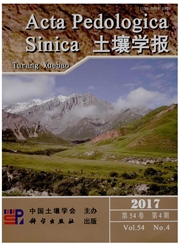

 中文摘要:
中文摘要:
城乡交错区经济的迅速发展对土壤pH产生了明显的影响。以无锡市某城乡交错区为例,研究了土壤pH的时空变异及与土壤性质的关系,探讨了影响土壤pH变化的主要因素。结果显示,该区土壤pH变化较大(3.74—8.50),土壤酸度由交换性H^+、Al^3+共同决定,蔬菜地土壤由于交换性H^+和Al^3+的出现降低了盐基总量和盐基饱和度,导致pH降低。稻田改种蔬菜后,土壤明显酸化,pH均值从6.43降至5.40;工企业周围土壤pH也明显降低;相反,在城镇周围及公路两侧土壤pH则明显较高。综合分析表明,该地区土壤pH的变化受农业活动影响较大,包括土地利用的变化,持续的强烈利用和大量施用无机化肥等;另外,工业活动也使得企业周围土壤pH明显降低;其次,公路和城镇建设带入的碱性物质使土壤pH增加,建议增加有机肥施用及水旱轮作进行改良。
 英文摘要:
英文摘要:
The impact of rapid economic development on soil pH is obvious in peri-urban areas. A case study of a peri-urban area of Wuxi was conducted to study spatio-temporal variation of soil pH in the area and explore its relationship with soil chemical properties and its affecting factors. Results indicate that soil pH varies significantly (3.74 - 8.50). When the field changed from paddy field into vegetable garden, its soil became acidic with mean pH value decreasing from 6.43 to 5.40. Soil pH also decreased significantly in soils around industrial enterprises, while it increased in soils around towns and alongside highways. Soil acidity is determined jointly by exchangeable H^+ and Al^3+. Their appearance in vegetable plots led to reduced total exchangeable base and base saturation degree, and hence lower pH in the soil. Comprehensive analysis shows that agricultural activities, including change of land use, continuous intensive utilization and heavy application of inorganic fertilizers, were major factors affecting soil pH, while construction of highways and towns bringing in alkaline substances to the soil followed in contribution. Therefore, higher organic manure application rate and paddy-upland rotation is suggested for the study area.
 同期刊论文项目
同期刊论文项目
 同项目期刊论文
同项目期刊论文
 Relationships between distributions of longevous population and trace elements in the agricultural e
Relationships between distributions of longevous population and trace elements in the agricultural e 期刊信息
期刊信息
